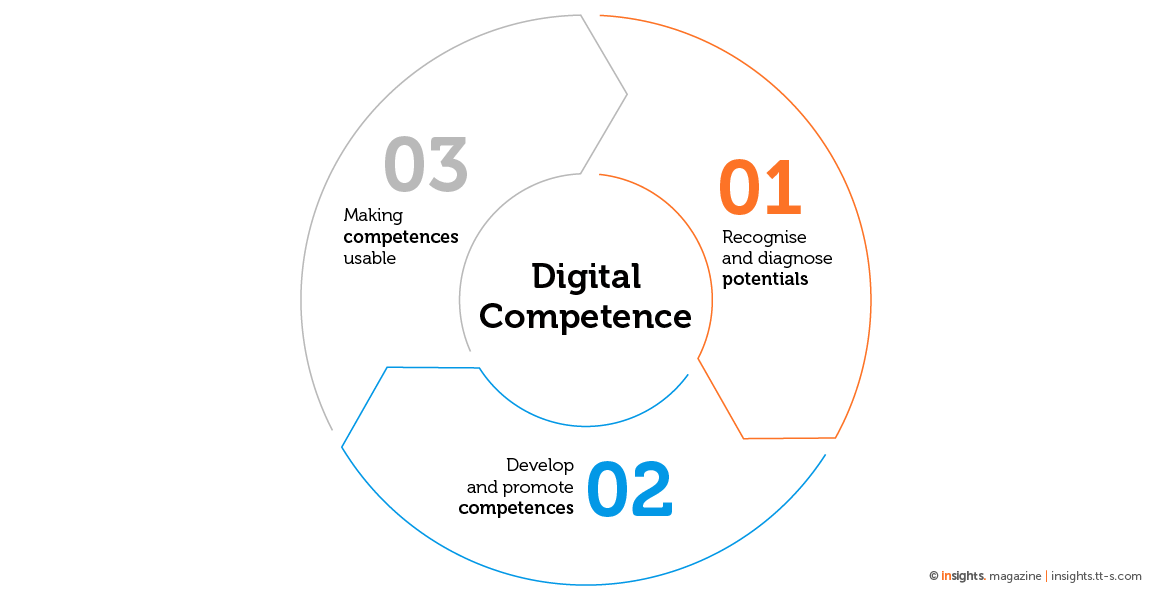Digital skills – indispensable for the 21st century

As the concepts of New Work and Work 4.0 take hold, the entire HR community has come to realize that the world of work is experiencing major upheaval. Besides giving rise to new employment opportunities and job profiles, digitalization is also making our professional lives in general ever more complex, fast paced and unpredictable.
As soon as the hard facts are laid on the table, however, many are taken aback by the sheer magnitude of this transformation. At its annual meeting in 2020, for example, the World Economic Forum estimated that more than one billion people will need to retrain by 2030, as almost a third of all jobs worldwide will undergo fundamental change due to the use of digital technologies and artificial intelligence. The organization also predicted that 42 percent of core competencies required to perform existing jobs will need to be adapted to digitalization.
The underlying presumption is that learning by doing is struggling to keep up with the pace of technological advances. To close this gap, certain competencies need to be strengthened going forward – and digital skills are top of the agenda.
Alvin Toffler, Alvin Toffler, US futurist, 1928–2016
The illiterate of the 21st century will not be those who cannot read and write, but those who cannot learn, unlearn, and relearn
What is digital competence?
From an HR perspective, the promotion of digital skills might mean making human resource processes more flexible, providing state-of-the-art HR tools, or setting out personalized paths for life-long learning – the list goes on. In this way, staff could develop new capabilities in the employee lifecycle at their own pace and thereby confidently and efficiently meet new demands whenever they arise in their day-to-day work.
This might sound entirely logical at first, but it still fails to explain what type of know-how should actually be nurtured in the course of digitalization. The Official Journal of the European Union, 2018/C 189/9 sheds some light on the matter – or, more specifically, its definition of the term “digital competence” does:
“Digital competence involves the confident, critical and responsible use of, and engagement with, digital technologies for learning, at work, and for participation in society. It includes information and data literacy, communication and collaboration, media literacy, digital content creation (including programming), safety (including digital well-being and competences related to cybersecurity), intellectual property related questions, problem solving and critical thinking.”
Digital skills are transferable
Transposed to the context of day-to-day operations, we are looking at a whole bunch of core competencies that will help employees of all ages tackle the challenges they are facing right now and those they will have to face in the future as digitalization forges ahead.
The focus here is not just on specific qualifications or technical expertise in using new technologies and digital products. It is about a comprehensive set of soft skills in areas such as managing your own workload, communicating, networking, empathy, curiosity, not to mention the ability to make decisions and adapt. Any competencies which support employees in the challenges that digitalization brings up. These competencies cannot be taught in isolation from one another and in just any old way. The following model shows which soft skills are particularly important for mastering digitalization:
|
Personal skills |
Proactive skills |
Social communication skills |
Technical-methodological skills |
|
Guided by values: Acting in line with agile values |
Decision-making skills: Making swift decisions using digital systems |
Ability to solve problems: Successfully solving problems using digital systems |
Organizational capabilities: Actively and successfully overcoming challenges using digital systems |
|
Taking responsibility: Acting responsibly using digital systems |
Willingness to take action: Competently and happily carrying out tasks using digital systems |
Ability to work as part of a team: Developing solutions in collaborative processes |
Systematic and methodical approach: Systematically and methodically achieving operational goals using digital systems |
|
Self-management: Managing own workload using digital systems |
Consistency: Acting logically using digital systems |
Adaptability: Adapting to people and changed (digital) framework conditions |
Awareness of consequences: Recognizing the consequences of decisions in advance |
Based on the above definition, digital skills constitute a set of various core competencies that ensure the individual in question is confident and critical in using digital technologies, particularly those used for obtaining information, communicating or solving problems. Since people primarily need to recall their skills while working, carrying out projects or communicating with their team, passing on lots of knowledge in one go in the hope learners will retain it all isn’t good enough. It is also important that staff know how they can access information or expertise as required, be that online, on the intranet or via digital media.
What requirements do I have to meet? Whom and what do I need in order to do that? How do my digital tools work? After that, it’s just about knowing what you don’t know. And let’s not forget a dose of digital intelligence so you can quickly fill that gap in knowledge when the need arises.
Developing digital skills in three steps
When developing digital skills within a company, it’s often best to use the model shown above as a guide. Once you’ve analyzed which skills are to be developed or provided to staff “on demand” so they can take the next steps themselves, it’s worth opting for a mix of various methods.
Put into practice, the three following steps will help you establish a system for boosting your workforce’s digital skills:
- Examine the current state of affairs regarding digital skills so as to identify and analyze opportunities
- Balance out gaps in skillsets through staff development and recruitment
- Create a suitable working environment to make sure that the company can make use of employees’ digital skills in the near future
For example, seminars and workshops are a sensible option when the goal is to teach communication skills or techniques for self-organization. These learning formats are not always suitable, however. Other times, it’s best to go for a combination of e.g. classroom teaching and eLearning, blended learning or performance support on the job. Either way, what’s vital is an educational concept that helps staff make the switch from formal learning controlled by someone else to informal, independent learning. This ensures all staff members are supported equally – regardless of their prior knowledge and potential generational differences.

Building digital competence in 3 steps
These steps form a dynamic cycle that can help companies to readjust when there have been fundamental changes. At each stage of their employee journey, it is a good idea to determine whether a staff member is lacking certain essential skills so they can develop them in a timely fashion. Skills should also be reviewed during the recruitment process. Adopting this approach ensures that new hires already have a majority of the desired skills and that the entire workforce undergoes continuous, structured training on or off the job.
Creating the right conditions
When it comes to digital skills, creating the right conditions in the workplace is just as important as the right mix of skills analysis and didactics. This has a decisive influence over whether and to what extent people put the skills they are taught to use and build on them independently.
Technology should be suited to the task at hand and correspond to the state of the art. With that in mind, it is worth getting rid of outdated technologies so that digital innovations quickly spread and gain a high level of acceptance.
In order to acquire and constantly expand digital skills, staff need to be offered the appropriate training and enough time to take advantage of it. Although many companies have grasped the gravity of the situation, they are still less than generous with regard to basic and further training. In fact, a survey conducted by the German industry association Bitkom revealed that seven out of ten professionals believe they are poorly equipped for the future, because they simply do not have the time at work to undertake training offered to them on how to use new digital technologies.
Conclusion
In short, companies have numerous battles to fight when it comes to developing their employees’ digital skills. This undertaking also needs to be a focused and lasting endeavor rather than a half-hearted attempt. We are, after all, talking about a worthwhile investment in the future of the company.




